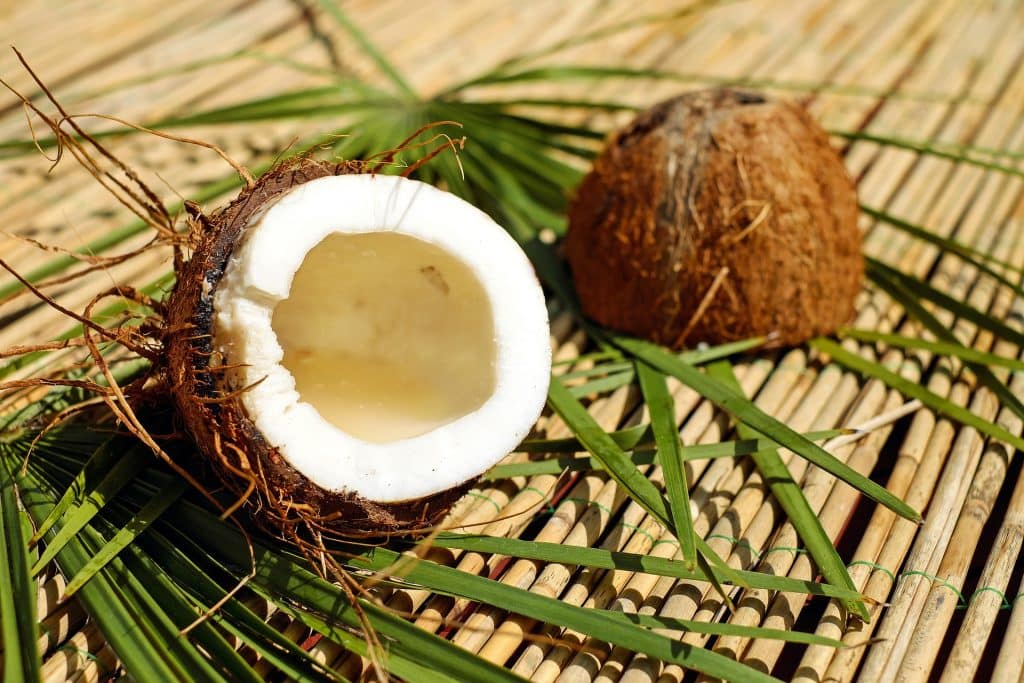Can Dogs Eat Coconut? A Vet’s Opinion

Coconut is a safe choice for humans, but can you feed Coconut to your dog?
Yes, dogs can eat Coconut. Coconut is an excellent source of vitamins, minerals, and fiber that can help dogs’ health in several ways.
Benefits Of Coconut For Dogs
Here are some further details on the advantages of Coconut for dogs:
- Coconut oil is a natural moisturizer that promotes healthy skin and fur. It can be used to relieve dry, itchy skin. It includes medium-chain fatty acids with anti-inflammatory and anti-microbial effects, such as lauric acid. They can lessen skin odor and aid in preventing bacterial and fungal infections. Moreover, coconut oil helps create a lustrous coat and lessens shedding.
- Immune system stimulation: The body transforms lauric acid, found in coconut oil, into monolaurin. The antiviral, antibacterial, and antifungal activities of monolaurin have been demonstrated to support immune system development and infection prevention.
- Medium-chain triglycerides (MCTs), which are readily digested and can aid in promoting gut health, are found in coconut oil and facilitate digestion. MCTs have been demonstrated to enhance nutritional absorption, lower gastrointestinal inflammation, and support healthy microbiota. Coconut oil also aids in controlling bowel motions and avoiding constipation.
- MCTs, included in coconut oil and may pass the blood-brain barrier, give the brain a rapid energy source and support brain function. MCTs may aid in enhancing cognitive performance, slow down cognitive aging in older dogs, and even guard against neurodegenerative disorders like Alzheimer’s, according to studies.
- Anti-inflammatory properties: The anti-inflammatory and antioxidant chemicals found in coconut oil can aid in lessening inflammation throughout the body.
- Digestion aid: Coconut oil may assist in enhancing digestion and lessen gut irritation. It includes MCFAs, which are quickly absorbed by the body and rapidly digested, giving off energy. Moreover, coconut oil may aid in regulating bowel motions and avoiding constipation. Moreover, coconut oil may lessen intestinal inflammation, which is advantageous for canines with inflammatory bowel disease (IBD) or other digestive issues.
Boosting brain function: MCFAs in coconut oil, such as caprylic acid and capric acid, have been proven to enhance cognition and may work to stave off age-related cognitive
- decline. Moreover, coconut oil may assist in enhancing memory and learning while lowering brain inflammation.
Many dog health issues, including arthritis, skin allergies, and digestive issues, have been connected to chronic inflammation. The use of coconut oil may assist in lowering inflammation and enhancing general wellness. It’s important to remember that while Coconut may have certain advantages for dogs, a balanced diet should always be provided. Also, due to its high-fat content, Coconut should only be given to your dog in moderation, as was already indicated.

How To Safely Give Coconut To Dogs?
When offered in moderation and cooked correctly, Coconut may be a healthy and nourishing supplement to a dog’s diet. The following advice will help you safely give Coconut to dogs:
- Choose the correct kind of Coconut: For dogs, fresh or unsweetened Coconut is preferable. Please don’t give your dog coconut items that have been sweetened or flavored since they might include extra sugars or artificial additives that are bad for dogs.
- Properly prepare the Coconut: Dogs may consume Coconut in various forms, including raw, shredded, and coconut oil. Remove the Coconut’s tough outer shell before cutting it into bite-sized pieces for your dog to easily chew and digest if you’re giving your pet raw Coconut.
- You may top your dog’s food with coconut flakes, and you can put coconut oil in their meals or use it topically to address skin and hair problems.
- Start with little sums: Introduce Coconut cautiously if your dog has never eaten it before to prevent gastric distress. Start with a bit of Coconut and gradually add more as time goes on.
- Keep an eye out for allergy or intolerance symptoms: It’s vital to keep an eye out for symptoms of digestive trouble or allergic responses, such as vomiting, diarrhea, or itching. Some dogs may be sensitive to or intolerant to Coconut.
- Use Coconut sparingly: Coconut has a lot of fat, which, if ingested in excess, can irritate the stomach or create obesity.
In conclusion, when served in moderation and cooked correctly, Coconut can offer several health benefits to dogs. The finest choices are fresh coconut flesh and coconut oil; dry coconut flakes and coconut water should be avoided.
Will Coconut Make A Dog Sick?
Introducing Coconut to dogs too soon or in excess could make them sick. Overfeeding your dog coconut, which is heavy in fat and incredibly saturated fat, can result in digestive problems like diarrhea, vomiting, and pancreatitis. Moreover, certain dogs may be sensitive to or allergic to Coconut. They may get rashes, vomiting, diarrhea, or difficulty breathing if they consume it. It’s better to add Coconut to your dog’s diet gradually and in moderation to avoid stomach problems. The hard outer shell of fresh coconut meat can be a choking hazard. Thus the meat should permanently be removed and sliced into small pieces before consumption. It’s crucial to cease giving your dog coconut immediately and call your veterinarian if you observe any symptoms of digestive distress or an allergic response after feeding it Coconut.
Vet’s Summary
Coconut may be a wholesome supplement to a dog’s diet if offered sparingly and cooked correctly. But, giving your dog too much Coconut or introducing it too early might upset their stomachs and perhaps make them ill. Some dogs may be allergic or intolerant to Coconut because of its high-fat content. To avoid causing digestive distress or allergic responses in your dog, it’s crucial to introduce Coconut gradually and in moderation.
Probiotics, however, provide several health advantages for dogs. Probiotics are good microorganisms that can strengthen the immune system and ease digestion. Also, they can aid in lowering the chance of developing certain diseases, including diarrhea and urinary tract infections. Probiotics can also assist in treating dietary intolerances and allergies, and in some instances, they can even make some dogs feel less stressed and anxious. Yogurt and kefir are two examples of foods that include probiotics. You may also give your dog supplements that contain probiotics. To ensure probiotics are secure and suitable for your dog’s diet, you should speak with a vet before introducing them to their diet.

Videos To Watch
Find out if Coconut is suitable for dogs in the video link given below:
Are you concerned about your dog’s safety when it comes to Coconut? Well, find out if you can feed Coconut to your dog in this video:






